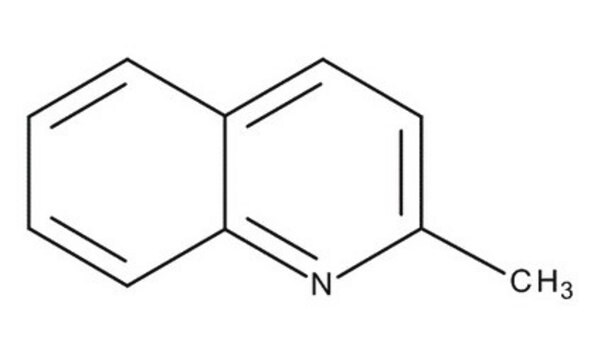Q2125
Quinaldine
analytical standard, ≥90% (GC)
Synonym(s):
2-Methylquinoline
About This Item
Recommended Products
grade
analytical standard
Quality Level
Assay
≥90% (GC)
technique(s)
HPLC: suitable
gas chromatography (GC): suitable
refractive index
n20/D 1.612 (lit.)
bp
105-107 °C/10 mmHg (lit.)
248 °C (lit.)
mp
−9-−3 °C (lit.)
density
1.058 g/mL at 25 °C (lit.)
application(s)
forensics and toxicology
pharmaceutical (small molecule)
format
neat
SMILES string
Cc1ccc2ccccc2n1
InChI
1S/C10H9N/c1-8-6-7-9-4-2-3-5-10(9)11-8/h2-7H,1H3
InChI key
SMUQFGGVLNAIOZ-UHFFFAOYSA-N
Gene Information
human ... CYP1A2(1544)
Looking for similar products? Visit Product Comparison Guide
Application
Signal Word
Warning
Hazard Statements
Precautionary Statements
Hazard Classifications
Acute Tox. 4 Dermal - Acute Tox. 4 Oral - Aquatic Chronic 3 - Eye Irrit. 2 - Muta. 2 - Skin Irrit. 2
Storage Class Code
10 - Combustible liquids
WGK
WGK 3
Flash Point(F)
174.2 °F - closed cup
Flash Point(C)
79 °C - closed cup
Personal Protective Equipment
Choose from one of the most recent versions:
Already Own This Product?
Find documentation for the products that you have recently purchased in the Document Library.
Customers Also Viewed
Our team of scientists has experience in all areas of research including Life Science, Material Science, Chemical Synthesis, Chromatography, Analytical and many others.
Contact Technical Service












